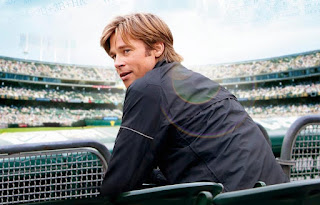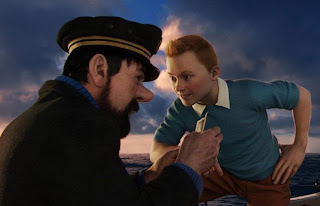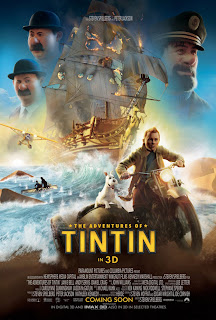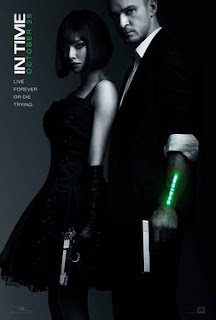by Patrick Gibbs
In terms of sheer volume, I may have seen more films this year than any other, and while as previously displayed, some of them were really terrible, and of course many were just kind of there (and here I am thinking of The Iron Lady), there were some truly terrific movie going experiences to be had. I've actually left a number of my top movie going experiences of the year off the list, simply because they were re-releases, but I can't look back on the time I spent in a darkened theater in 2011 without thinking of Ghostsbusters, The Lion King, and most of all the extended Lord of the Rings trilogy.
But now, onto the great films of this year:
1. (tie) War Horse and Hugo
I have not had trouble choosing a clear standout best film of the year since 2000, when Gladiator, Crouching Tiger Hidden Dragon, and O Brother Where Art Thou? were all vying for the top spot, but this year, I couldn't choose between these two. It seems like such an obvious choice to go for the Spielberg and Scorsese films, but for me it is the only choice. War Horse is genuinely one of Spielberg’s best films, beautifully photographed, emotionally involving and perfectly paced. In addition, it features a steady stream of moving, wonderfully understated performances by a talented cast, and the best very best of all come from the horses themselves. This is a genuinely perfect movie that harkens back to the days of the great Hollywood epics, and is something to be celebrated.
When I first saw Hugo, I heard people saying it was nothing you'd expect from Martin Scorsese. I would argue that anyone who says that doesn't really know who Scorsese is as an artist or as a person. This is the quintessential Scorsese film, a masterful work of art that stands as a stunning tribute to the medium of film from one of it's greatest contributors. “Have you ever wondered where your dreams come from? This is where they are made.” I could not agree more.
2. Harry Potter and the Deathly Hallows, Part 2
The Harry Potter series is more than just movies or books to me – it's an entire magical world all it's own, and it has been my privilege to get to spend time there. Harry and company have been there with me through many of the biggest ups and downs of my life, and I weep openly every time I watch this film. Seeing the series come to an end at last was probably the single most defining moment of the year for me, and it's something I am still processing. 3. Rise of The Planet Of The Apes
“Apes alone weak. Apes together . . . strong.”
Andy Serkiss gives hands down the most mesmerizing performance of the year as Caesar, the William Wallace of the primate family, in a rare movie that surpasses all expectations. Thoughtful, emotional, suspenseful, and ultimately inspiring, this is a far cry from Tim Burton's insipid remake earlier this decade. Director Rupert Wyatt deserves major kudos for letting the apes be the main characters and forcing the humans to take a back seat, and rarely has more been expressed though facial expression and body language. Quite possibly the riskiest movie of the year, in that much of what is seen here could have produced laughs if not pulled off perfectly, but even as I watched it for the first time in an audience made up entirely of cynical film critics that are hard to impress, the sequence wherein Tom Felton renders unto Caesar the most iconic line from the Planet of the Apes series, and Caesar actually speaks back, the only reaction to what by all rights should have been a cheesy moment was an audible gasp going through group and at least one “whoa.” Why? Because this was a movie that dared to say good enough isn't good enough, and just because this is popcorn entertainment doesn't mean it shouldn't be truly great.
4. (tie) Moneyball and The Muppets
In a year when I found myself doing a lot of soul searching, two movies stood out to me and said “Hey, the main character in this film – that's you.” Those character are Billy Beane (played by Brad Pitt), the general manager of a baseball team who is in a desperate search for an elusive feeling of accomplishment and meaning, and Walter, an aspiring Muppet who does not quite fit in anywhere, but deep down just wants to be a part of the thing he loves most. There are many other reasons to love these two films, but the fact that they both spoke to me on a uniquely personal level and are so insightful that I often still find them running through my head at night gives them a special place on my list.
5. The Adventures of Tintin
A rousing and thoroughly enjoyable adventure from beginning to end, that recalls the best of Indiana Jones, James Bond and Alfred Hitchcock. As a fan of Hergé's creation since childhood, I found this movie to be a sheer joy. This is everything I expect from a collaboration between Steven Spielberg and Peter Jackson, and after being so dismally disappointed by their first teaming, 2009's The Lovely Bones, this was a great Christmas gift.
6. The Conspirator
Robert Redford managed to make a far better film about the pitfalls of the war on terror, and the division of political ideologies that can threaten a nation, with this post Civil War true story than he did with the unfocused, meandering Iraq war diatribe Lions For Lambs. This truly an unforgettable, and deeply disturbing film, and one that everyone should see.
7. SUPER 8
 J.J. Abrams salute to the golden age of Spielberg, aliens, and adolescence, is a terrific thrill ride that is also filled with heart. The young ensemble gives some of the most sincere and believable performances of the year, and for those of us who were spending are Junior High years running around with a camera, this is a movie that resonates in an exciting and heartfelt way.
J.J. Abrams salute to the golden age of Spielberg, aliens, and adolescence, is a terrific thrill ride that is also filled with heart. The young ensemble gives some of the most sincere and believable performances of the year, and for those of us who were spending are Junior High years running around with a camera, this is a movie that resonates in an exciting and heartfelt way. 8. The Artist
9. The Help
 Brilliant acting and touching human drama combine in a story that could have been manipulative and maudlin, but is instead is sincere and utterly profound. A movie that fills you with joy and a sense of outrage at the same time, but ultimately leaves you feeling hopeful. I have to wonder how many people watched this film and were appalled at the treatment of black people in the south decades ago but are clueless as their own part in discrimination today.
Brilliant acting and touching human drama combine in a story that could have been manipulative and maudlin, but is instead is sincere and utterly profound. A movie that fills you with joy and a sense of outrage at the same time, but ultimately leaves you feeling hopeful. I have to wonder how many people watched this film and were appalled at the treatment of black people in the south decades ago but are clueless as their own part in discrimination today. 10. Coriolanus
Ralph Fiennes directs and stars as Caius Martius Coriolanus in this big screen adaptation of a play that was, and I cannot emphasize this enough, not written by Edward De Vere, damn it. The best Shakespeare film I've seen in a decade and a half, and easily the best modernized incarnation, this is a passionate and unflinching piece of storytelling. The choice by Fiennes and screenwriter John Logan of a modern setting for this tale of war and political intrigue in ancient Rome is no mere gimmick – it's a motivated choice that brings a timely resonance to a timeless tale. The stellar cast includes Vanessa Redgrave, Brian Cox, 2011's most impressive newcomer, Jessica Chastain (The Help, The Debt) and a surprisingly low key and nuanced Gerard Butler, who is allowed to keep both his shirt and his accent, and as a result, actually acts for the first time in years, and does so very well. Fiennes promises to be a very interesting director, and let's hope this isn't his last foray into adapting Shakespeare.
Honorable Mentions: (in random order) Winnie The Pooh, Midnight in Paris, Kung Fu Panda 2, X-Men: First Class, Captain America, Mission: Impossible - Ghost Protocol and Thor.



































